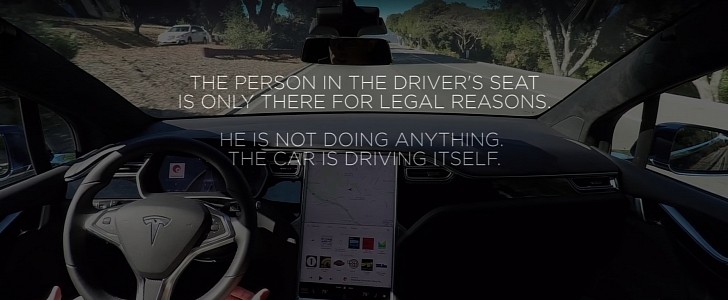Some people may claim that a promise is only unfulfilled if it does not deliver the promised results. When the promise includes a deadline, no excuse makes it valid after it ends. With that in mind, Tesla escaped a lawsuit for a long time after Elon Musk’s constant promises that Full Self-Driving (FSD) and Autopilot would turn Tesla’s cars into robotaxis and “appreciating assets,” as the EV maker CEO said they would be.
According to Reuters, plaintiff Briggs Matsko sued Tesla in a federal court in San Francisco, arguing that the company and Musk have been pledging autonomous cars for Tesla customers since 2016. Matsko’s attorneys claim that the company either said the pieces of software were fully functional or “just around the corner.”
On the Autopilot page on Tesla’s website, the company still has an embedded video published six years ago that states the EV in the footage – a Model X – only has a driver for legal reasons. According to the disclaimer, “the car is driving itself.” The New York Times debunked another video with the same text in December 2021. The newspaper revealed the video was edited to hide a crash the Model X had while shooting it.
Reuters said that Matsko accused Tesla of trying to drive up its stock price with these unfulfilled promises, as well as of trying to boost sales, attract investments, and avoid bankruptcy. The plaintiff is one of the people that believed his 2018 Tesla Model X would eventually become a robotaxi by paying $5,000 for Enhanced Autopilot.
Matsko wants the federal court to grant his class-action lawsuit status. That means that all customers affected by the company’s promises could be included in the compensations eventually awarded by the case.
This is not the only recent accusation of deceptive advertisement of Tesla’s software. On July 28, the California Department of Motor Vehicles (DMV) said the EV maker did the same thing, which could cost Tesla its license to sell vehicles in the State. Regarding the lawsuit, Matsko asked for unspecified damages. Everyone who bought or leased Tesla vehicles with Autopilot, Enhanced Autopilot, or FSD since 2016 could be included if the lawsuit becomes a class action.
On the Autopilot page on Tesla’s website, the company still has an embedded video published six years ago that states the EV in the footage – a Model X – only has a driver for legal reasons. According to the disclaimer, “the car is driving itself.” The New York Times debunked another video with the same text in December 2021. The newspaper revealed the video was edited to hide a crash the Model X had while shooting it.
Reuters said that Matsko accused Tesla of trying to drive up its stock price with these unfulfilled promises, as well as of trying to boost sales, attract investments, and avoid bankruptcy. The plaintiff is one of the people that believed his 2018 Tesla Model X would eventually become a robotaxi by paying $5,000 for Enhanced Autopilot.
Matsko wants the federal court to grant his class-action lawsuit status. That means that all customers affected by the company’s promises could be included in the compensations eventually awarded by the case.
This is not the only recent accusation of deceptive advertisement of Tesla’s software. On July 28, the California Department of Motor Vehicles (DMV) said the EV maker did the same thing, which could cost Tesla its license to sell vehicles in the State. Regarding the lawsuit, Matsko asked for unspecified damages. Everyone who bought or leased Tesla vehicles with Autopilot, Enhanced Autopilot, or FSD since 2016 could be included if the lawsuit becomes a class action.
















